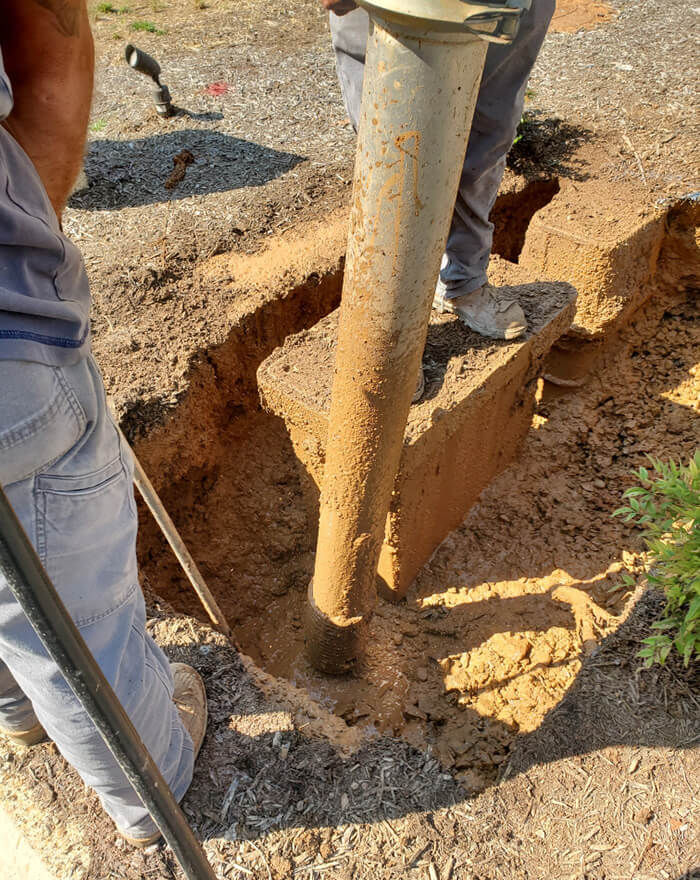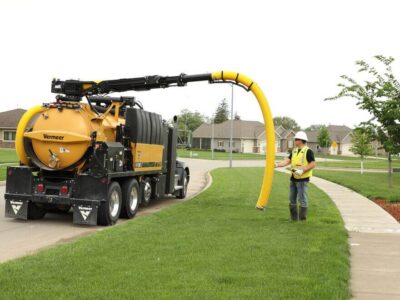With a population of nearly 30,000 people and climbing, the City of Maryville, Tennessee, has been experiencing a big spike in utility development over the last two to three years. To expand its underground infrastructure and maintain existing lines, city crews are using niche equipment, like vacuum excavators, to locate and soft dig in sensitive areas.
“I’ve been here almost 23 years now, and I’ve never seen as much new construction, both residential and commercial, going on as we’re experiencing right now,” said Scott Brown, fleet superintendent for the City of Maryville.
According to Brown, his position is responsible for outfitting city crews with the equipment they need to complete the municipality’s day-to-day applications, including utilities (electric and water), public works, grounds, maintenance, police, fire and engineering departments. He said with all the new infrastructure comes the need to install more utilities, including fiber, gas and sewer lines, as well as the expectation that the work will be done right the first time.
“Our residents expect nothing less than perfect from our city crews, from garbage pickup and brush collection to the fire and police departments,” added Brown. “And they expect the installation of new utilities to be just as perfect. It’s how we work.”
Working with the right equipment
To keep up with the influx of utility work — and people’s expectations — the City of Maryville invested in a Vermeer truck vacuum excavator (a VXT8 truck vac, the predecessor to the Vermeer VXT300 vacuum excavator). It was added to the municipality’s existing vacuum excavator fleet, which also includes a Vermeer LP 573SDT trailer vac and a Vermeer VX50-500 trailer vac.
“When we bought our first trailer-mounted vac unit, we bought it kind of on a whim,” Brown said. “At the time, a lot of people asked me where we would use it. We put it to work right away, and the next thing I knew, I had departments fighting over it because they saw all of its possible uses, including cutting in and setting meter basin and taps. It just kind of blew up from there, so we invested in a second trailer — and now we bought the truck.”
Before adding the Vermeer truck vac to the fleet, Brent Robbins, a utility work professional with the City of Maryville in the water and sewer department, said city crews kept their trailer vacs busy. The trailers are particularly well suited for sewer line work. They’re equipped with specialty features like a jetter and hydraulic valve turning arm, so crews use them to back out valve boxes, then operate and exercise the valves.
But the two trailer units weren’t enough to keep up with demand. With the type of work the City of Maryville crews were taking on, Brown knew they needed a bigger, more powerful vac. He called on Tim Hedrick with Vermeer Heartland for help in choosing the right model to add to their fleet. Knowing the applications that the City of Maryville crews were handling, Hedrick recommended a truck vac with an 8-cu-yd (6.1-m³) spoil tank capacity and 800-gal (3,028-L) water tank capacity.
“The biggest advantage of the Vermeer truck vac is that it has a whole lot more capacity in the tank, and it hauls more water than trailer vacs,” said Robbins. ”Another advantage of our new vacuum excavator is how quiet it is to operate. All I have to do is hit the vac brakes and throttle it down, and I can stand right there beside the boom and talk with my crew. It’s also a piece of cake to run.”
Brown added, “I’ll just tell you that the best of Vermeer are my people over at (Vermeer) Heartland. The support we get from them over there is huge. Tim has been nothing but awesome. We work with them on vacs, as well as a wide range of other equipment that our city uses on a daily basis.”
Taking on more projects
The Vermeer truck vac has allowed the municipality’s crews to take on new work. “We use the truck for potholing utilities and excavating around existing infrastructure,” said Robbins. “There’s getting to be so much infrastructure in the ground now that we run into a lot of situations — like we’re not able to dig or don’t want to take a chance of damaging anything with a backhoe — so we use the new vac truck to hydro-excavate material out.”
For example, Robbins said that happens when his crews are called to find and dig up a meter box in a flower bed. “We’ll use that truck vac to suck out the dirt around that meter box, and we don’t tear up nearly as much stuff as we would if we went in there with a backhoe,” he said.
On another occasion, Robbins added, the crew vacuumed out 6 ft to 7 ft (1.8 m to 2.1 m) of ditch with existing utilities in it because there was stuff in the way. “It was just a lot faster to vac it out than it would have been trying to figure out the backhoe,” he said.
One project Robbins mentioned the crews took on with their vacs was rehabilitating sewer lines. He said, “On this rehab, we came through a few days before the project started and potholed everything out, flagging the utilities, and then we came right back in and started on the sewer.”
Robbins mentioned that the city crews have used their vacs to hydro-trench, digging 6 ft to 7 ft (1.8 m to 2.1 to lay new utilities into the ditch. Also, they have vac’d out some storm-catch basins that had a lot of gravel and dirt in them with the vacuum excavator. “We vac them out, cleaning them out for public works,” he added.

With these Vermeer vacs, the City of Maryville crews have been able to do more work in-house, rather than outsource projects to subcontractors. “I’d say we do 95% of the work with our own crews and equipment,” said Robbins. “When we get a big sewer job, we’ll still sub it out because we just don’t have the people to do it plus keep up with all our maintenance work. But on smaller projects, anywhere between 400 feet and 1,000 feet (121.9 m and 300.8 m) of line, we’ll lay it ourselves.”
Even when the City of Maryville crews call on subcontractors to help out, the vacs come in handy, helping the two parties work together quickly and efficiently. “We’ve got a lot of good contractors in the area that we work with, but we don’t want to leave it all up to them on whether or not they think something should be potholed. Instead, we want to be the ones pointing the utilities out, saying, ‘See, there it is, right there,’” Robbins said.
He added, “If we have lines that are critical, like a main feeder line that runs between tanks or something, most of the time, we’ll pothole them to make sure everyone — both our crews and the contracting crews — know where the utilities are, even after they’ve been located. Any critical line, we pothole those ourselves. This means we’ve done our due diligence in helping these folks avoid hitting something when they’re installing new lines.”
Expanding their in-house operations
Utility work isn’t the only operation the City of Maryville has been doing more of in-house lately. The city recently added a Vermeer TR5300 trommel screen at its wood recycling facility.
“We’ve got a full-blown composting facility out near the wastewater treatment plant, sitting on a 5-acre (2-ha) concrete pad,” said Brown. “It’s quite the operation, and a service we are continuing to expand for the good of the community. Our goal is to process all of the city residential green waste into mulch and compost, and then return the organic material back to citizens of Maryville for use.”
The City of Maryville believes in providing the best quality services for its citizens. To do that efficiently and effectively, they do as much of the municipality’s work in-house as possible. “We very seldom sub stuff out anymore because we have talented, trained teams working in all of our city departments. Our people take a great amount of pride in what they do, how they do it and when they do it,” said Brown. “It’s a winning combination that keeps all the city’s public utilities operating a peak efficiency and helps maintain the beauty of the community.”
To learn more about Vermeer vacuum excavators for your municipality, contact your local Vermeer dealership.
Vermeer MV Solutions, Inc. reserves the right to make changes in engineering, design and specifications; add improvements, or discontinue manufacturing at any time without notice or obligation. Equipment shown is for illustrative purposes only and may display optional accessories or components specific to their global region. Please contact your local Vermeer dealer for more information on machine specifications.
Vermeer and the Vermeer logo are trademarks of Vermeer Manufacturing Company in the U.S. and/or other countries. © 2023 Vermeer MV Solutions, Inc. All Rights Reserved.
